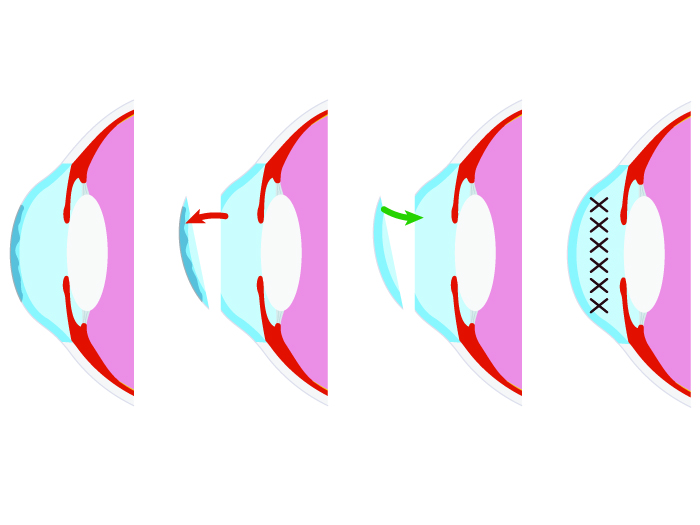Keratoplasty Treatment & Diagnostics in MRC Nagar, Chennai
Keratoplasty
Cornea is the outermost protective part of the eye through which light enters. A healthy cornea is extremely important for clear and focused vision. Cornea is the only eye part that can be transplanted if it gets damaged. Whenever you hear about people donating their eyes, it's actually the corneas that they donate after death.
To know more, you can visit a corneal detachment hospital in Chennai. Or search online for a corneal detachment specialist near me.

What do we need to know about cornea transplant surgery?
Keratoplasty, also known as corneal transplant, is a surgical procedure performed to replace damaged or diseased corneal tissue with a healthy one from a donor. It is performed by an eye surgeon. The replacement can be done either on the full cornea or on some part of it depending upon the damage caused.
What are the different types of corneal surgery?
Depending upon the affected portions, corneal transplant is done either to replace the entire corneal thickness or partial cornea thickness. Different methods include:
- Full thickness or penetrating keratoplasty : This is performed when there is severe corneal damage. In this case, all the corneal layers are replaced. A special tool is used to cut out the entire damaged cornea and a healthy one is placed with the help of stitches.
- Partial thickness or anterior lamellar keratoplasty (ALK) : It is performed when the inner corneal layer is healthy but the outer and middle layers of the cornea are damaged. The tissues of the middle and the outer layer are then replaced with healthy ones from a donor cornea.
- Artificial cornea transplant (keratoprosthesis): The damaged cornea is replaced with an artificial cornea.
Who qualifies for this procedure? What are the causes?
If contact lenses and power glasses are unable to correct your blurred vision, then you need keratoplasty. If you have any of following conditions, then you might require keratoplasty:
- Cornea scarring because of an infection like trichiasis, eye herpes or fungal keratitis
- Formation of ulcers and sores in the cornea
- Bulged-out cornea due to any disease
- Thinning and distortion of the cornea
- Hereditary eye problems like Fuchs' dystrophy
- Failure of previous eye surgeries causing corneal damage
- Advanced keratoconus
- Traumatic injuries that penetrate or scar the cornea
- Edema of cornea
- Damaged cornea due to eye injury
- Inflammation of the cornea caused by viruses, bacteria, fungi or parasites
To seek treatment, you can visit a corneal detachment hospital nearyou as well.
When do you need to see a doctor?
If you have any of the issues mentioned above, please consult your eye doctor.
You can request an appointment at Apollo Spectra Hospitals, MRC Nagar, Chennai.
Call 1860 500 2244 to book an appointment.
What are the risks associated with keratoplasty?
This procedure is considered to be safe, but some risks may include:
- Eye infection because of problems in stitches
- Glaucoma
- Bleeding
- Donor corneal rejection
- Problems in the retina like swelling or detachment
- Cataract
A cornea transplant not only brings back clear vision but it also corrects the shape and appearance of the cornea. This surgery improves the quality of life of an individual.
Although most cornea transplant procedures are successful, doctors say in 10% of the cases, the immune system may reject the donor corneas. Symptoms like blurred or no vision, redness and swelling in the eyes, pain in the eyes or sensitivity towards light may indicate rejection. This requires immediate medical attention or another transplant.
Usually a patient can go home on the same day of surgery. Oral medications and eye drops are prescribed by a doctor along with certain instructions on how to take care of your eyes after surgery. But still if you experience symptoms like breathing difficulties, nausea, chest pain, chills, fever and vomiting, then immediately consult your doctor.
Our Doctors
DR. SRIPRIYA SANKAR
MBBS, Madras Medical...
| Experience | : | 30 Yeras Experience |
|---|---|---|
| Speciality | : | Ophthalmology... | Location | : | Alwarpet |
| Timings | : | Tue, Thur: 05:00 PM ... |
DR. PRATIK RANJAN SEN
MBBS, MS, DO...
| Experience | : | 23 Yeras Experience |
|---|---|---|
| Speciality | : | Ophthalmology... | Location | : | Alwarpet |
| Timings | : | ON CALL... |
DR. SRIKANTH RAMASUBRAMANIAN
MBBS, MS (Ophthal), ...
| Experience | : | 14 Yeras Experience |
|---|---|---|
| Speciality | : | Ophthalmology... | Location | : | Alwarpet |
| Timings | : | Mon, Wed, Fri | 10... |
DR. MEENAKSHI PANDE
MBBS, DO, FRCS...
| Experience | : | 27 Yeras Experience |
|---|---|---|
| Speciality | : | Ophthalmology... | Location | : | Alwarpet |
| Timings | : | Available on prior a... |
DR. SAPNA K MARDI
MBBS, DNB (Opthal)...
| Experience | : | 30 Yeras Experience |
|---|---|---|
| Speciality | : | Ophthalmology... | Location | : | Alwarpet |
| Timings | : | Tue, Thur : 10:00 AM... |
DR. ASHOK RANGARAJAN
MBBS, MS (OPHTHAL), ...
| Experience | : | 20 Yeras Experience |
|---|---|---|
| Speciality | : | Ophthalmology... | Location | : | Alwarpet |
| Timings | : | Mon, Wed, Fri : 6:00... |
DR. M SOUNDARAM
MBBS, MS, FCAEH...
| Experience | : | 8 Yeras Experience |
|---|---|---|
| Speciality | : | Ophthalmology... | Location | : | Alwarpet |
| Timings | : | Available by prior a... |
DR. MANOJ SUBHASH KHATRI
MBBS, DO, DNB, FICO(...
| Experience | : | 15 Yeras Experience |
|---|---|---|
| Speciality | : | Ophthalmology... | Location | : | Alwarpet |
| Timings | : | Available by prior a... |
DR. UMA RAMESH
MBBS, DOMS, FRCS...
| Experience | : | 33 Yeras Experience |
|---|---|---|
| Speciality | : | Ophthalmology... | Location | : | Alwarpet |
| Timings | : | Sat : 12:00 PM to 1:... |
Our Top Specialities
NOTICE BOARD
CONTACT US
CONTACT US
 Book Appointment
Book Appointment











.svg)
.svg)
.svg)
.svg)








